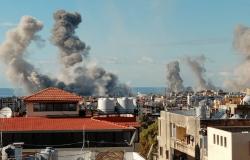par Pavel Polityuk, Vladimir Soldatkin et Nina Chestney
(Reuters) – Russia has informed Austria of the suspension of its gas deliveries from Saturday, which should lead to the rapid closure of the last route for Russian gas to Europe.
The move means Russia will now only supply Hungary and Slovakia, a far cry from the dominance that saw it cover 40% of the European Union’s (EU) gas needs before its full-scale invasion of Ukraine in February 2022.
Austrian Chancellor Karl Nehammer sought to reassure his fellow citizens about his country’s capabilities, affirming that no home would be deprived of heating.
“Something that has been expected for a long time, since the beginning of the war in Ukraine, has happened and we have prepared ourselves to deal with this situation,” he said at a press conference , specifying that Austrian gas capacities were 93% full.
Austria was the first Western European country to buy Russian gas in 1968, a few months before the USSR intervened in Czechoslovakia.
In a note published on the Central European gas platform website, the Austrian gas company OMV indicated that it had been informed by its Russian counterpart Gazprom of the end of gas deliveries from Saturday.
Gazprom did not respond to a request for comment.
The end of gas deliveries follows a dispute between the two companies.
Austria is one of the only European countries still dependent on Russia for its gas supplies, with most other states on the continent having already reduced their imports following the war in Ukraine, turning to the United States , Norway and Qatar.
OMV said it was prepared for the end of Russian gas supplies and wanted to reassure about its capabilities to deliver gas to its customers via pipelines from Germany, Italy and the Netherlands.
“We still expect this to exacerbate the energy crisis in Austria, which has caused a significant drop in gas demand and affected the manufacturing sector,” commented Eurointelligence analysts.
This announcement comes as Russian President Vladimir Putin spoke by telephone with German Chancellor Olaf Scholz, a first since December 2022.
Before the conflict in Ukraine, Germany was particularly dependent on Russian gas.
Russia has said it is ready to enter into energy negotiations if Berlin shows interest, according to the Kremlin.
“It was emphasized that Russia has always strictly adhered to treaties and its contractual obligations in the energy sector and is ready for mutually beneficial cooperation if the German side shows interest,” the Kremlin said.
Russia delivered some 15 billion cubic meters of gas via Ukraine in 2023, representing only 8% of Russian gas flows transiting to Europe via various routes in 2018-2019, the peak of Russian deliveries, according to data compiled by Reuters.
The delivery of Russian gas to Europe through Ukraine could stop on January 1, 2025, with Kyiv refusing to renegotiate the agreement concluded for five years.
(Pavel Polityuk, Yuliia Dysa, Thomas Seythal and Vladimir Soldatkin, Kate Abnett, Zhifan Liu for the French version)
©2024 Thomson Reuters,
all rights reserved. Reuters content is the intellectual property of Thomson Reuters
or its third party content providers. Any copying, republication or redistribution
of Reuters content, including by framing or similar means, is expressly prohibited
without the prior written consent of Thomson Reuters. Thomson Reuters shall not
be liable for any errors or delays in content, or for any actions taken in reliance
thereon. “Reuters” and the Reuters Logo are trademarks of Thomson Reuters and its
affiliated companies.





